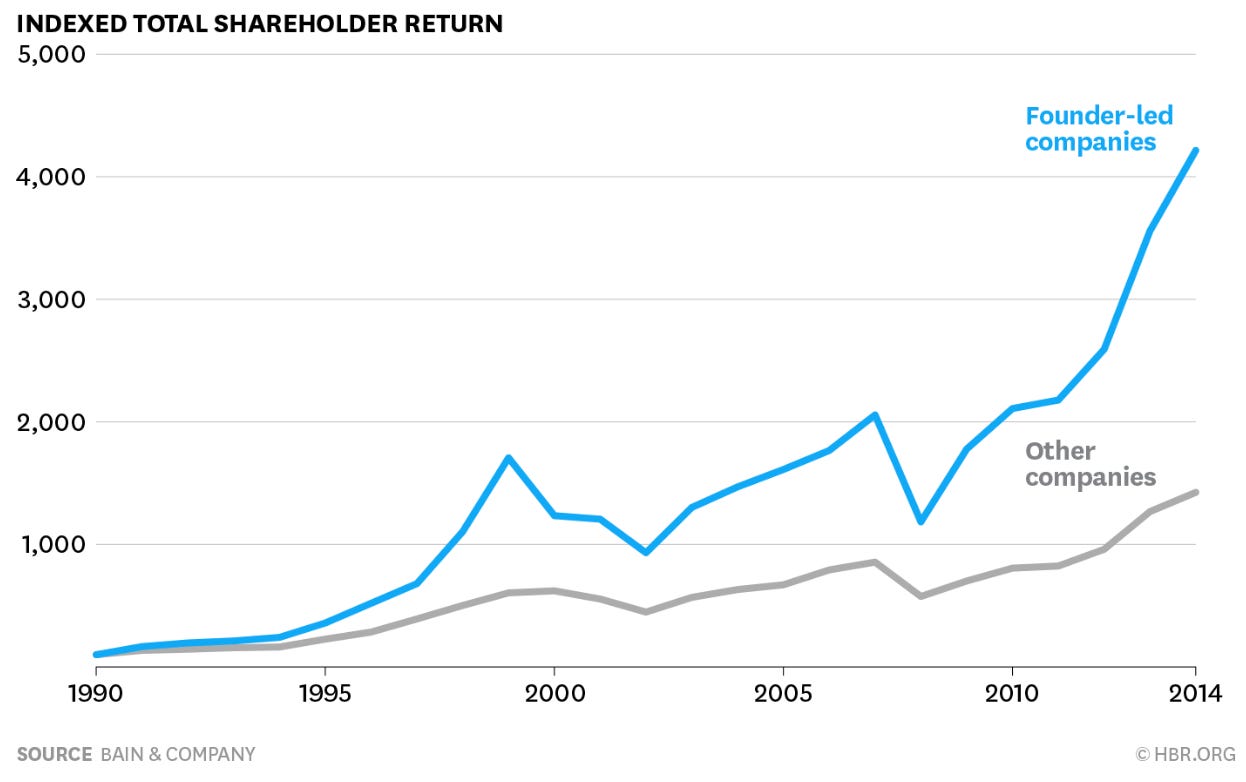Travel Tech Essentialist #133: Founder-Led
Advice from Marc Andreessen to startups on how to hire professional CEOs: “Don’t. If you don’t have anyone on your founding team capable of being CEO, then sell your company—now.”
Pattern sponsors this newsletter:
Pattern enables online businesses to provide their customers with personalized insurance products powered by its innovative platform. Enhancing customer experience in bookings and registrations, Pattern learns consumer preferences through machine learning to deliver the most meaningful, tailor-made propositions. Customers benefit from a single integration to offer multiple products controlled via a no-code backend and optimized conversions. Contact Pattern to learn more.
0. The most clicked link in the previous newsletter
The most clicked link in Travel Tech Essentialist #132 was the folder with the 6 travel trend reports from Expedia, Lastminute, Skyscanner, Hilton, Booking and Visa.
1. Founder-led content
Tommy Clark, founder of Compound Content Studio, explains why Airbnb’s feature announcements often come from founder Brian Chesky’s personal Twitter account before the official Airbnb account.
Let’s compare Brian Chesky's Nov 8th Winter Release announcement on his personal Twitter account vs Airbnb's announcement made on the same day:
Views 👀: 2.5 million vs 30.1k
Reposts 🔁: 809 vs 40
Likes ❤️: 5.4k vs 75
Bookmarks 🔖: 1k vs 3
Airbnb’s announcement achieved only 1.2% of the reach, 5% of the reposts, 1.4% of the likes, and 0.3% of the bookmarks compared to Chesky’s tweet.
Tommy’s takeaway is that for companies, especially those in early or growth stages with no name recognition, leveraging a founder's social media presence can significantly amplify the message.
It’s not rocket science. Customers want to hear from founders. Not faceless company brand accounts.

2. Non-founding CEOs absent from Twitter
Following up on the previous topic, I did a quick research on the level of Twitter activity by the current CEOs of some of the largest publicly traded and privately held online travel companies.
Brian Chesky stands in a league of his own
Not a single non-founding CEO in this list has even a Twitter account. All CEOs with Twitter activity are also cofounders.
Of the 11 Founders/CEOs with a Twitter presence, only three - Brian Chesky, Avi Meir, Richard Valtr - have posted something in the last 2 months.
3. Founder-led companies outperform the rest - here’s why
A study shows that S&P 500 companies where the founder is still CEO are more innovative, perform 3.1 times better, generate 31% more patents, create patents that are more valuable, and are more likely to make bold investments to renew and adapt the business model. One of Andreessen Horowitz’s core investment principles is their preference for founding CEOs (a16z). This article by Bain & Company (a bit dated - 2016, but its insights are still applicable) tries to answer why. Among the key factors highlighted are:
Deep Engagement and Purpose: These companies maintain a clear sense of purpose or mission, leading to higher employee engagement and a strong focus on solving problems and innovating.
Front Line Obsession: Founders often exhibit a deep curiosity and understanding of the front-line operations, leading to a company culture that values and empowers those directly involved in business operations.
Owner’s Mindset: Founders bring an attitude of personal responsibility for risks and costs.
4. Founder-led sales
Many startup founders are the lead salespeople. Daniel Trujillo writes in OpenVC why founders are so effective in sales:
“Founder-led sales is more than a strategy - it embodies the startup's vision, mission, and values.” — Daniel Trujillo
This article states some of the key reasons why founder-led sales outperform the rest:
Founders have an in-depth understanding of their products, allowing them to address concerns and showcase value effectively.
The direct engagement adds a personal touch, building trust and relationships.
Being on the frontline, founders can quickly pivot based on customer feedback when necessary.
Founders can weave their company's vision into sales narratives, making their pitches more impactful.
The article also states some of the challenges that founder-led sales can face.
5. The dark side of sales
Here’s a must-read for any startup founder or CEO hiring a sales team. David Sacks’ The Dark Side of Sales explains how to prevent the unintended consequences that powerful incentives can create. A strong incentive plan is necessary to motivate and retain the best salespeople, but it can lead to unforeseen issues if not managed carefully. He describes 10 perverse incentives that sales plans can create and how they can be balanced and corrected by creating a sales compliance regime along with the incentive plan.
6. Global travel brand search queries
In 2017, eight years post-launch, Airbnb surpassed Expedia, Tripadvisor, and Kayak in search queries, and the gap has only widened since then. Booking.com has maintained its lead in queries, but the last three years have been a neck-and-neck race between Booking and Airbnb for the top spot in search popularity.
In the past month, search trends for these five travel brands show Airbnb's stronghold in the Americas, Oceania, and India. Booking.com takes the lead in Europe, Russia, China, and the Middle East, while Southeast Asia, Africa and the rest of the world are divided between the two. There are only 10 countries where neither Airbnb nor Booking.com comes out on top. Expedia leads in the Bahamas, Bermuda, Sierra Leone, Guyana, Suriname, and Trinidad & Tobago; Tripadvisor in Cuba, Burkina Faso, Aruba, and St Lucia; KAYAK reigns in Monaco.
7. Opportunity knocks for luxury disruptors
The luxury market grew 8-10% in 2023, hitting €1.508 trillion. This article in the Robin Report notes that while the personal luxury goods sector is growing more slowly, the experiential luxury segment, including travel, is accelerating, with consumers favoring unique experiences over material goods. This dynamic could open opportunities for disruptors by carving out niches and focusing on highly curated experiences. The shift from items you own to unique experiences you enjoy can open up opportunities for travel disruptors targeting the luxury market directly or partnering with the growing number of retail brands expanding into hospitality to capture this trend.
8. Luxury brands’ newest hospitality additions: Chopard and Louis Vuitton
Speaking of luxury goods brands expanding into hospitality and the shift from luxury you own to luxury you experience, Chopard opened its first hotel, '1, Place Vendôme' (Robb Report), while Louis Vuitton revealed plans for its first-ever hotel (also in Paris) in 2026 (House & Garden). They join other luxury brands that have launched hospitality ventures, like Bulgari (Bulgari Hotels) and Armani (Armani Hotels).
9. Forgotten hotel product: Sleep Experience
Sleep is one of the hottest wellness trends.
David Kijlstra, founder of Highest Season, wrote about a significant oversight in the hospitality industry: Despite hotels being the biggest players in the global sleep business, those in hospitality barely talk or focus on it. He believes that recognizing and capitalizing on this aspect offers lucrative opportunities. Kijlstra notes that while some hotels are already capitalizing on this trend, the industry at large seems to be missing out on lucrative opportunities centered around sleep.
For instance, the Equinox Hotel in New York has designed its rooms focusing on sleep and even offers sleep coaching services for guests. Similarly, The Benjamin Hotel in New York City provides a specialized sleep experience with a "top 10" pillow menu, a 24/7 sleep team, and a lullaby music library. Sleep packages can both improve guest experiences and present unique upselling options without needing extra space.
Kijlstra also recommends integrating sleep-enhancing options in food and beverage menus and forming partnerships with wellness brands, like the collaboration between English brand Anatome and hotels, to create new revenue streams centered around sleep. Read + Hotel Nuggets.

10. Economy Seat, Executive Suite
This work-from-plane setup by Alvaro Echeverría is redefining business class. This is what happens when you take ‘remote work’ literally. Let's hope the neighbor’s bladder cooperates.

Are you fundraising?
If you are a startup looking to raise a round (from pre-seed to Series D), maybe I can help (for free). Travel Investor Network is a private platform where I recommend innovative travel startups to investors and innovators. If you’re interested, please start by completing this form.
Travel Tech Essentialist Job Board
Explore hundreds (currently 728) of open positions on Travel Tech Essentialist’s curated Job Board and stay ahead of the curve by subscribing to job alerts to get notified about all new listings or tailor your alerts to fit your interests, like the latest roles in Spain, Marketing roles in London, or the newest remote opportunities. Here’s a sample of the jobs you’ll find:
Fora, Senior Product Designer (New York City). Salary range: $160k-170k + equity.
Airbnb, Programs and Business Operations Lead (Remote). Pay Range:
$160k - $194,500
Inspirato, Director, Business Intelligence & Analytics (Remote). Base Salary: $126k - $164k
→ Are you hiring? If you want your company's openings featured on our job board, please fill out this quick 1-minute form, and we’ll showcase your opportunities to our talented community of professionals.
→ If you're contemplating a career move, simply curious, or an HR professional seeking job insights, subscribe to my newly launched Travel Tech Jobs newsletter.
If you like Travel Tech Essentialist, please consider sharing it with your friends or colleagues. If you’re not yet subscribed, you can do so here:
And, as always, thanks for trusting me with your inbox.
Mauricio Prieto








